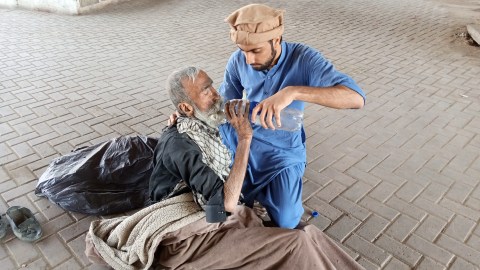How humans ended up the most altruistic of animals

Credit: Sarwer e Kainat Welfare from Pexels
- Humans are more altruistic than any other animal, but why is that?
- One theory suggests culture and genetics combined to provide groups that worked well together an edge in competition.
- Others suggest that groups could be subject to evolutionary pressures.
Humans are different from other animals in a lot of ways. While some of these differences are obvious to any observer, others are more subtle. Among the latter is our unique approach to altruism. While many animals demonstrate some kind of altruistic tendency, humans take it further and apply it to more situations than any other creature. The question of why we do that is a big one. Several well-argued and supported theories offer explanations for it.
A recent essay published in the philosophy journal Synthese clarifies one of the more intriguing of these explanations.
There are different kinds of altruism, and examples of them can be seen in both human and animal behavior all the time. “Kin altruism” is when you take actions that cost or harm you but benefit another person that you’re related to. A second type, “reciprocal altruism,” can occur with people you’re not related to, but who you can reasonably expect will be able to return the favor someday.
From the standpoint of genetic selfishness, both of these forms of altruism make sense. Helping out your kin, with whom you share DNA, promotes the evolutionary success of your genes, even if that success doesn’t belong to you specifically. Helping somebody likely to help you later is a kind of “enlightened self-interest” that assures aid to you when you need it.
However, humans sometimes behave in ways that cannot be easily placed in either of those categories. People often help perfect strangers who will be unlikely to return the favor in the future. Think of the last time you gave a homeless person some change or donated blood. The person you helped probably wasn’t related to you, and the likelihood of that person paying you back is relatively low.
Animals don’t act this way; their behavior fits nicely into the above two categories, so how did we come to have such a tendency to act this way?
In his essay “Explaining human altruism,” Dr. Michael Vlerick of Tilburg University offers a conceptual clarification of what some researchers have called “cultural group selection.”
When people think of evolution, they often think of the mechanism of natural selection. This is nature acting on the individual, with individuals who have traits that promote survival being “selected” to continue living and to spread their traits. However, other things can cause evolutionary pressure.
Dr. Vlerick, in previous publications, has argued that, within groups, cultural forces act to select for certain traits. Individuals who demonstrate consistent anti-social behavior are selected against over the long run. Eventually, you’re left with a group of individuals who are more pro-social than not.
In a sense, humanity created social environments that naturally selected for people who weren’t total sociopaths.
The hypothesis then suggests that this in-group selection dovetails with competition between groups. When a group of individuals that tend to work well together goes head-to-head against one that doesn’t, the former is likely to come out on top. In the long run, this leads to more, larger groups of pro-social individuals. If you repeat this endless times throughout human evolution, you end up with an animal capable of helping other members of its species in ways that other animals can’t.
There are alternatives to this idea. One of them argues that groups, in addition to individuals, can be subject to the pressures of natural selection and that group genetic selection is behind the behavior we observe. Groups of genetically homogeneous individuals compete with each other for resources. Groups that work well together, which are genetically predisposed for altruism and pro-social behavior, tend to out-compete others.
While this hypothesis could explain what we see, it relies on a few controversial assumptions. Among them, the idea that migrations between groups was extremely limited, and that the genetic differences between these groups were quite substantial. Neither of these points are supported by evidence, and many scientists reject this theory of “genetic group selection.”
The cultural group selection stance does not suffer from these problems as it doesn’t depend on either of these assumptions. It allows for migration between groups and requires only that people can choose to be altruistic and pro-social in ways that others cannot, not that they are genetically hardwired to act that way all the time. Groups that decide to emulate successful, pro-social groups can also recreate an environment that selects for people who are willing to help strangers.
Dr. Vlerick points out that he isn’t suggesting that humans are hardwired to be altruistic to everybody all the time. We are not slaves to our genetic tendencies; but we are, in Dr. Vlerick’s words, “a particularly cooperative species with an evolved disposition for in-group altruism.”
These dispositions are subject to circumstance and the use of reason. He notes that most people, and even young children, can judge who is behaving fairly or not and, consequently, worthy of being treated justly.
We often find ourselves able to work with groups other than our own in achieving common goals, despite these cooperative and empathetic tendencies having evolved for in-group use. Most people would argue that their ethical systems apply to out-groups as well as whatever groups they place themselves in. This is the result not of evolution, but of the use of reason.
We spoke with Dr. Vlerick by email and he explained that this capacity to move beyond the limited cooperation we evolved for will have to be utilized to solve current global issues:
“Today we’re faced with global problems requiring us to cooperate globally (climate change, mass migration, poverty, COVID-19 pandemic). Our evolved nature does not equip us well to do so; we’re wired for in-group cooperation, not global cooperation. But we aren’t slaves to our nature, we can overcome our innate tribalism through reasoning, and we have already made massive strides in this respect. It’s our moral responsibility to ‘become better than our nature’.”
Humans have an innate capacity for altruism that other animals lack. When combined with our tendency to live in large groups with people we aren’t related to and our ability to reason, many people find themselves helping perfect strangers reasonably often.
Is it all because we built a world where working together is frequently rewarded, and harming others is often punished? Perhaps, but while the exact cause of this disposition to helping others remains unknown, theories on why we are the way we are continue to crop up and provide us new ways of understanding ourselves.





